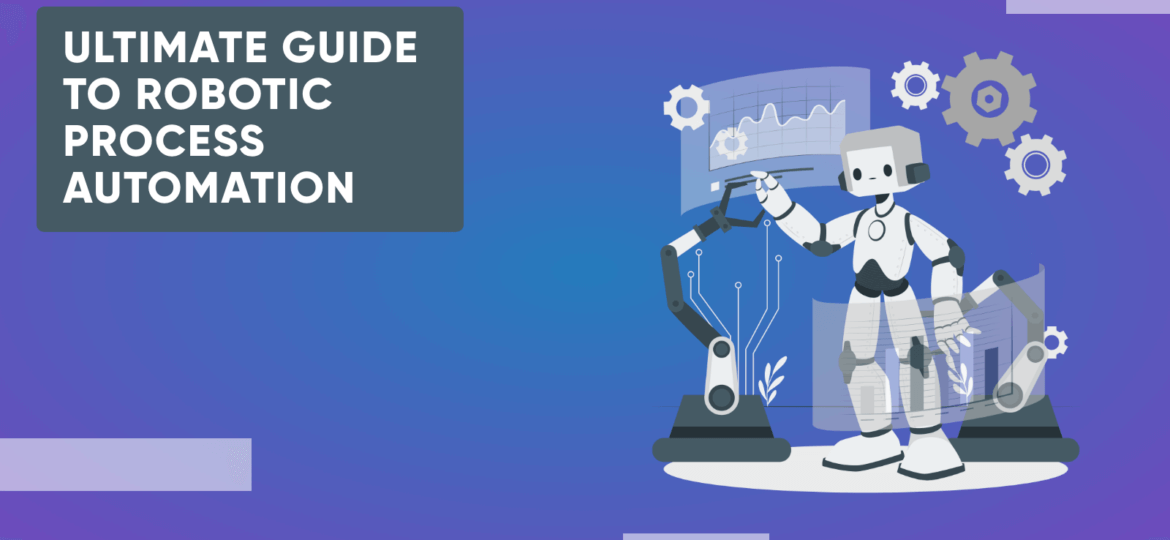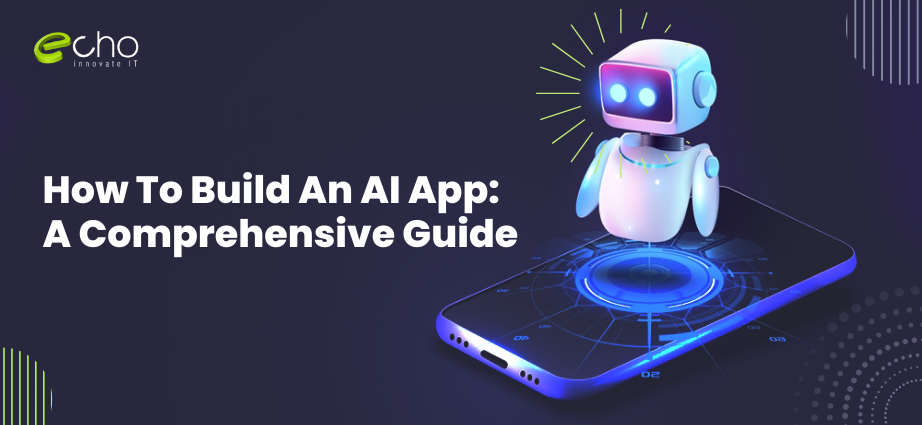‘RPA’ might be a new term for you but you are using it in some way in your daily life. In our daily lives, we all wish to perform effortless tasks. Think how fascinating it would be if someone does your basic work. Such as playing songs, switching on the lights or fans, etc. In the automation industry, Robotic Process Automation turns out to be one of its forever-widening parts.
As a matter of fact, RPA will astound you as it allows associations to mechanize tasks. This is an easier way as a person is performing them across applications and systems. In like manner, RPA has become one of the hottest trends in business technology. Of course, by gaining a lot of attention from digital leaders worldwide.
Correspondingly, Robotic Process Automation comes with the motive to shift the cycle of execution from humans to bots. IT architecture accompanies mechanical robotization with a negligible number of complicated system integration required. Similarly, RPA helps businesses to improve their efficiency, speed, and accuracy along with reducing costs and improving compliance simultaneously.
This blog will cover-
- The basics introduction of Robotic Process Automation Like What is RPA? or RPA Technology.
- Benefits of robotic process automation
- How does RPA work?
- RPA Use cases
Interested in implementing the perks of RPA in your own business or company? This blog will teach you everything you need to know. So, let’s start with the basic definition of Robotic Process Automation.
What Is Robotic Process Automation? (RPA)
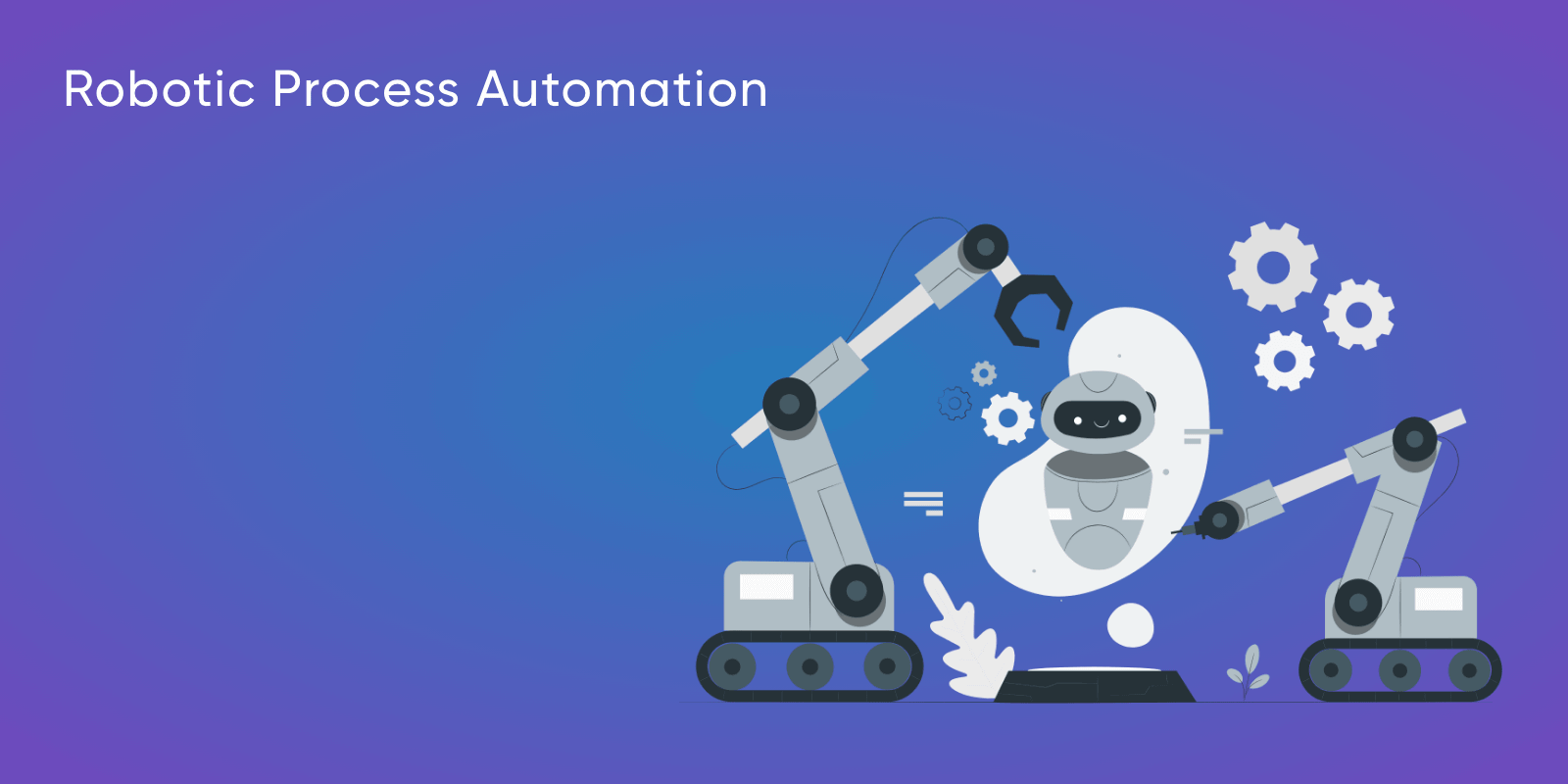
Robotic Process Automation (RPA) is a type of automation technology that has modified the way organizations operate. Additionally, RPA is agile software robots (‘bots’) that have the capability to mimic human actions in order to perform manual, repetitive, and time-consuming rules-based tasks that might be really difficult for human employees to execute.
Equally important, to obtain a well-organized manual process and decrease the excess workload on the employees, Robotic Process Automation relies on a scalable and digital workforce by giving repetitive tasks which can be easily performed by software bots in a more efficient manner with higher accuracy.
By the same token, RPA bots can follow the same steps in a process that human employees perform to communicate with business systems and applications. RPA is scalable, flexible, and efficient workflows that provide countless opportunities for automation throughout the business.
Robotic Process Automation is the most efficient and quickest way to get and deliver information into enterprise applications.
How does RPA work?
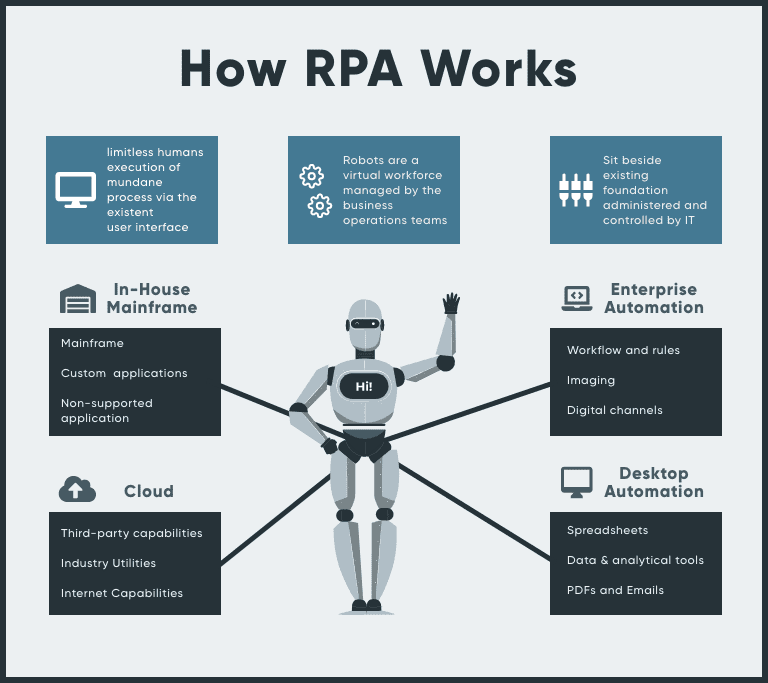
- Process library, controller dashboard, and a pool of bots are the pieces that complete the typical architecture for robotic process automation.
- All the routines and scripts that users define, the process library holds it.
- RPA platform’s dedicated scripting language and interacting with their computer user interface directly are the two options by which users can define routine.
- Decisions with if/then/else statements that depend on structured data are a part of automated routines.
- Users can assign routines to bots, either on a fixed schedule or ad hoc using the controller dashboard which is also the user interface for the Robotic Process Automation platform.
- For automating business processes, RPA bots can efficiently run on a local machine or on a virtual machine in the cloud.
- Cloud computing stores data residing in machines involving participants because of a traditional database structure. But blockchain is a tamper-free and reliable online database registry of various digital transactions. Where alteration of data is possible by participants after taking approval from each party involved in it.
- The controller dashboard is responsible for virtual RPA deployments which directs the allocation of RPA bots to particular virtual machines in the cloud.
- For RPA bots to execute their programming intelligent automation routines, these virtual machines offer the processing power, memory, and data storage.
What Are The Key Benefits Of Robotic Process Automation?
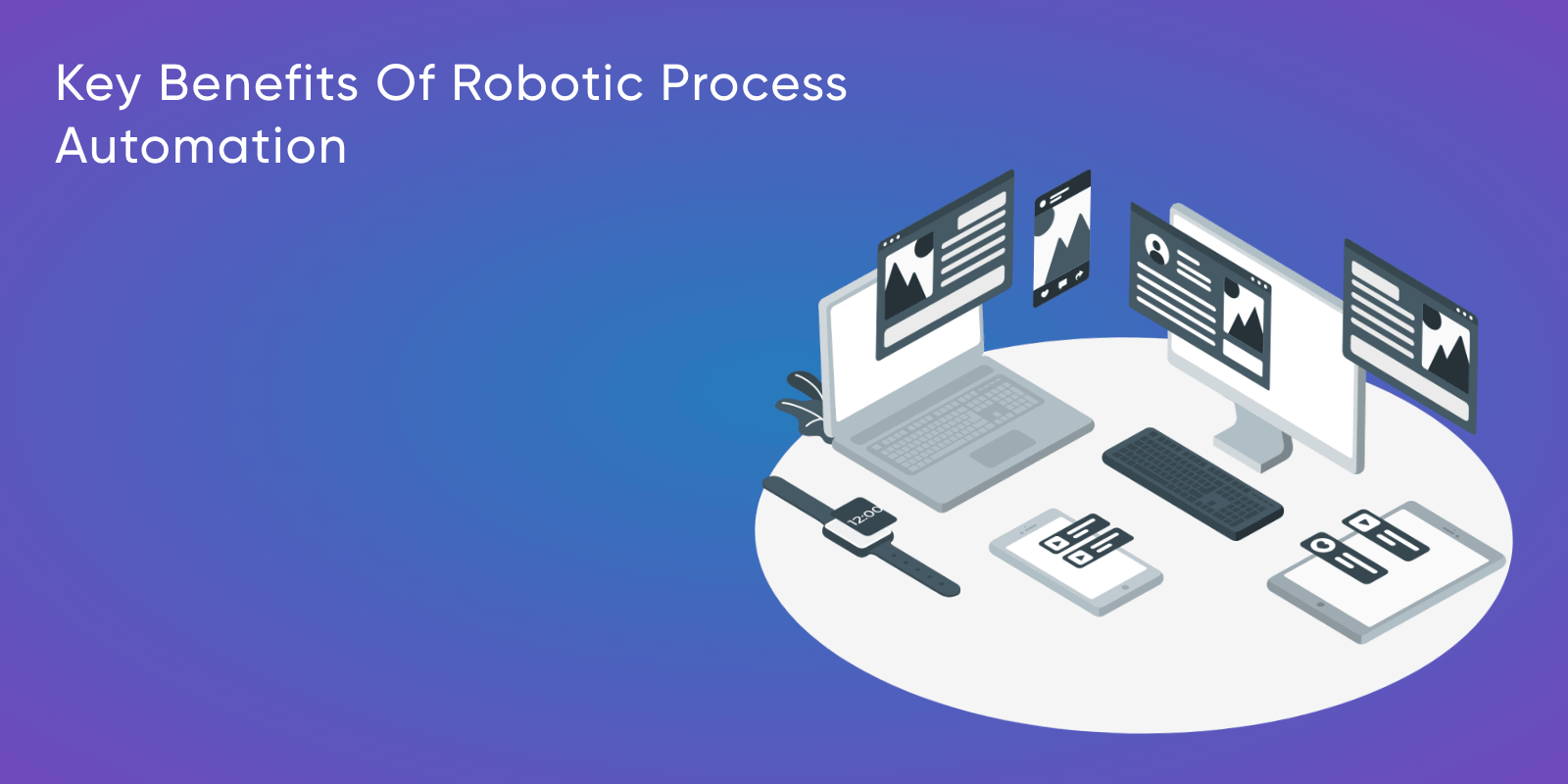
With the reduction in costly investments in new applications or systems, Robotic Process Automation is designed in such a way that it has the ability to boost productivity, improve accuracy, and will aid your business to expand by handing repetitive, manual workloads to software robots. Here are some of the benefits of RPA software, let’s have a look at them:
Mimic Manual Tasks
Mimic the manual tasks and free up your human workforce for a well-thought-out plan that will add value to your business.
Automate Integrations
The Central Automation platform helps to automate the integrations between existing systems, applications, and workflow without making expensive hardware changes or software development.
Scale Your Digital Workforce
Software robots are fast to design and bots work along with human employees to expand growth which will scale your digital workforce cost-effectively.
Enable Innovation & Collaboration
Centralizing automation and connecting data with detailed analytics will encourage innovation between IT and business teams.
The Major Industries Adopting Robotic Process Automation Solutions
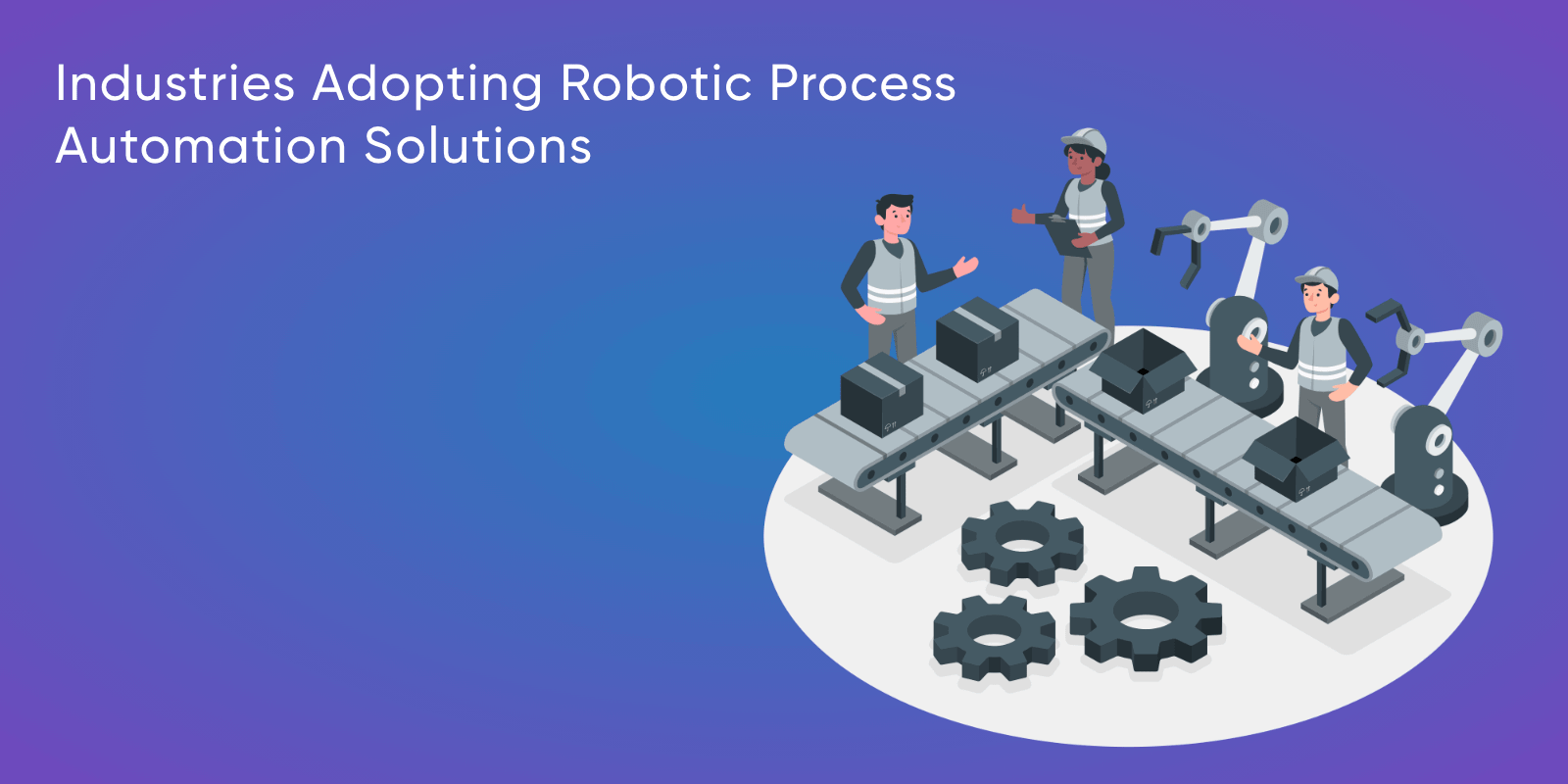
There are numerous industries that are utilizing RPA technology to expand their business operations.
We have come across several industries that are leveraging this tremendous technology. Let’s have a look at some of the industries that have implemented RPA:
Banking and Financial Services
According to the report by Forrester “it is expected that by the year 2023, the RPA services market will hit $12 Billion.” Also, finance and accounting space cover 36% of all use cases.
It is quite surprising to notice the banking’s early adoption of automation as there are more bots available today in the financial industry. Nowadays, RPA automation solutions are utilized by several major banks to automate tasks like account opening, customer research, inquiry processing, etc. Banks use numerous bots for the automation of manual high-volume data entry.
Retail
RPA has become an integral part of the modern retail industry because of the rise of eCommerce which has improved overall office operations and customer experience. Customer relationship management, customer feedback processing, and fraud detection, warehouse and order management are part of the well-known applications.
Healthcare
The prime components in the healthcare industry are accuracy and compliance. Robotic Process Automation software is used by some of the world’s largest hospitals for optimization of information management, insurance claim processing and payment cycles, prescription management, etc.
Summing it up!
Robotic Process Automation is growing at a rapid rate. Therefore, we can simplify it by saying that RPA is an automation technology that is used for software tools that reduce human tasks which are manual, rule-based, or repetitive. Robotic Process Automation enables human beings to perform repetitive tasks which are quite irritating for a human.
Copying human activities, establishing multiple duties, effortlessly completing high-volume repeated duties, product management, etc. are some of the general uses of RPA.
We hope that the doubts regarding Robotic Process Automation are clear through this blog.
FAQs of Robotic Process Automation
What can Robotic Process Automation do?
RPA can mimic human interaction and automatically perform any task using a computer. Be it copy-pasting data from one place to another, or performing advanced series or repeatable and predictable actions.
What is BOT in robotic process automation?
A BOT is a software that can perform predefined automation. BOTs can run 24X7.
Where is the use of RPA?
There is no real limit of RPA’s use within a business. However, typically RPA is used for high volume data-driven transactional tasks such as finance processes (invoice processing, Accounts payable, credit control, etc.) or the amalgamation of data sources.
Will our data be safe?
Yes, your data is 100% safe & secure and only your chosen people from your own organization have access to your data. Apart from this, your data is in an encrypted format. Also, when it is stored in databases as well as during transit between the server and your machine. To make sure, multiple security audits and reviews are helpful.
